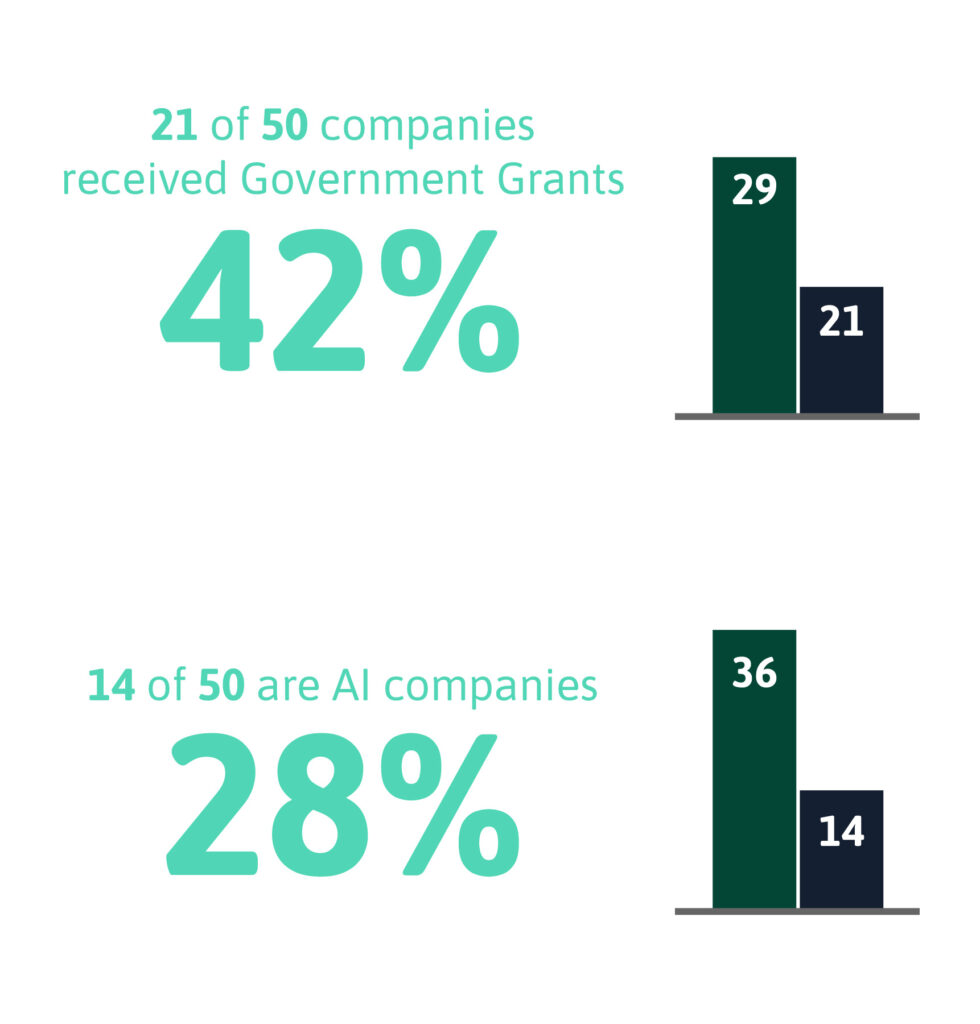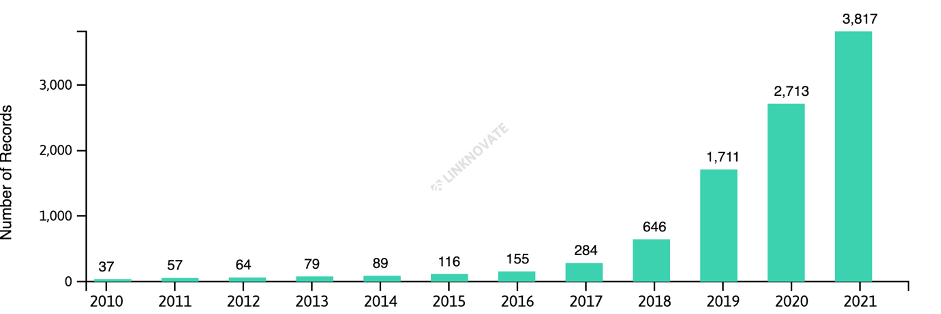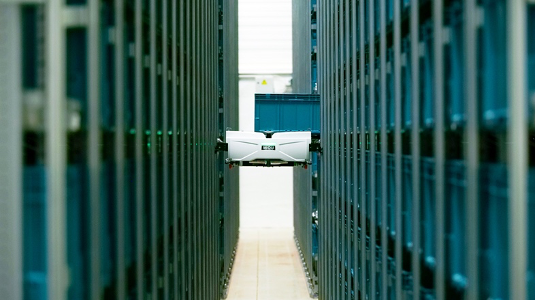This 2021 has not been as expected, it’s been even better. Month after month investment in startups has been growing steadily reaching its current 157% increase YoY. Investors in both early and late-stage startups have spent almost $80 billion alone in Q3’21 and there is still Q4 to go. All the previous quarters’ records have been crashed and we are not surprised.

However, it’s not all about the money, and particularly VC and startup funding. Research, development, and innovation is taking place worldwide across all industries and many forms: public funding, corporate partnerships, licensing agreements, IPOs, SPACs. From renewables to quantum computing, the future is happening right now, and we have a first-row ticket. As passionate as we are about innovation, we had to gather the 50 startups to watch in our own e-book.
Almost half of the selected startups have received government grants, which comes to show that not only private investors are behind the latest technologies. Also, 28% use AI in their technologies, quite interesting bearing in mind AI is almost everywhere.

So, let’s dive in. Here are the 10 most innovative industries and the startups that are making them thrive:
1. Green Energy: more than just a marketing concept
Sustainability is the word everyone is using as if it were lifesaving. The truth is a change of mentality is happening across all industries and energy is shifting focus towards greener and more sustainable processes. According to Linknovate, the number of records in this topic is x6 in just 3 years.

In fact, almost 90% of all new power capacity is expected to come from clean energy globally by 2022.
In Canada, Carbon Engineering is capturing CO2 directly out of the atmosphere at megaton scale. In other words, they are doing the work of 40 million trees, helping reduce climate change with their own technology. Climeworks, in Switzerland, is doing similar work but after removing the CO2 they are reusing it for business purposes including a research project with Rotterdam The Hague Airport in which they are researching the production of renewable jet fuel from air.
2. Robotics for an automated future
Robots are here to stay. The more efficient, more accurate robotic market is not only helping reduce the carbon footprint but it is also helping secure the supply chain with more productive, flexible and safe automation systems.

That’s what they are doing at Exotec, a French company that has developed a robotic order picking system enabling order preparation in retail logistics for big corporates such as Decathlon and Carrefour. Their robots, called Skypods, function as a fleet supporting the operators to prepare orders faster. The robots are constantly assigned tasks and are programmed to prioritize the most urgent task.
3. Mobility and logistics, smarter technologies
Using drones for deliveries at customer’s homes has been going on for a while, with better or worse results. However, using them for delivering vital items and medical supplies worldwide is something that Zipline, based in California is working on with amazing results. They are already in their series E and they raised $250M in June 2021. Their UAVs operate under difficult situations such as confict areas or after natural disasters.
In terms of smart transportation, Lilium, a german based startup, has already prototyped a 5 and a 7 seater aircraft, in other words a flying taxi which is faster, more efficient, and of course, sustainable.
4. Artificial Intelligence
From tech giants to startups, AI has put technology at the center of all organisations. No wonder the Compound Annual Growth Rate (CAGR) is expected to grow 40.2% from 2021 to 2028. Algolia is a North American startup focused on creating dynamic digital experiences for their clients’ customers. They do this by using AI to find the most relevant content so then developers can build apps with composable APIs.

5. Agritech and food, essential needs
Startups in the agritech industry have been receiving 6 times more investments in the past 10 years than before. Why? Because we are running out of food:
By 2050 the population will increase 25% from 7.8 to 9.7 billion. With less resources worldwide and more people than ever, the need for new technologies in the food industry is a fact.
Are mushrooms the solution? That’s what Smallhold believes. This startup’s objective is to help individuals, grocery stores and restaurants, grow their own mushrooms with their farming technology through automated, modular remotely-managed, and subscription-based growing systems. In our hometown, Santiago de Compostela, we also have a great example: Hifas da Terra, exploring the power of mycology for nutraceuticals and growing into European and the US markets.

6. Health, stronger than ever
The pandemic has boosted research and innovations in the health industry exponentially. Just as an example is the record development of. Covid-19 vaccines in less than a year. As per the graph below, you can see that the countries doing the most work for clinical trials in the area have been United States, United Kingdom and France.
Many startups have focused on telecare and medical IoT (Olive, Emids and Noom among others) to enable remote monitoring and faster diagnosis. Also, air monitoring startups have become very popular with technologies to purify and improve air quality everywhere, particularly in interiors. Breezometer in Israel, and CoClean in China are a few of the startups focused on this matter.
What makes Meru Health special is that they are focused on mental health. Via app, they combine a wearable biofeedback with anonymous peer-support and remote clinicians.
7. Biotechnology
The Biotech industry has also seen considerable growth after large investments made during the pandemic. Latest trends include genetic editing (Emmanuelle Charpentier and Jennifer Doudna won the Nobel of Chemistry in 2020 for their research), which may allow to add, replace, or silence particular genes in rare diseases; genetic sequencing, which recently helped paralyzed mice to walk again, and even 3D printing.
FabRx, for example, is a UK startup, founded by academics at University College London (UCL) focused on developing 3D printing technology for fabricating pharmaceuticals and medical devices. The idea behind this is to offer personalised medicines depending on your medical background. That’s taking customization to the next level.
8. Pharma, the trillionaire industry
In 2022, pharma industry will be worth $1.25 trillion according to Global News Wire.
Mergers and acquisitions are critical to this growth and also to any company’s development, their access to innovation and their manufacturing capacity.
With deals such as Takeda taking over Shire for $81.7 billion or more recently, AstraZeneca acquiring Alexion for $39 billion leading the M&A.
However, smaller companies such as PolyActiva in Australia, are also contributing to increase the industry’s value by generating a recurring revenue of $1.66M per year. This startup develops medical devices such as ocular implants, intra-articular gel implants, and drug-eluting fibers that deliver drugs inside the area of concern. As per the cloud word generated on Linknovate, you can quickly discover other relevant keywords in the company’s area of expertise.

9. Virtual Life
Everyone has been talking about the metaverse lately although there have already been a few attempts at making it profitable (remember Second Life?). Now it’s not a place to play it’s just a place to be in. Still, games (and gamers) are a big part of a very lucrative industry.
OverPowered Network (OPN), a startup based in Bahrein, helps organizations run gaming events, operates tournament venues, and is in the process of developing their own online channel for sports and gaming content called OP TV.

10. Quantum Computing and Security
Quantum Computing (QC) will grow at a CAGR of 30% by 2026 mainly because its early application in the banking and finance sectors, which, by the way, are not only the largest users of blockchain, but also currently hold the biggest share of the quantum computing market.
Some startups are developing hardware: different types of qubits, including trapped ion systems, silicon qubits, QC with neutral atoms or superconducting qubits to be able to optimise efficiency and costs in a wide variety of industries.
Others are focused on software and security like the British Crypto Quantique that provides local network-based cyber-security solutions for its clients or Proton, from Switzerland, offering secure email that doesn’t store any encryption keys.

All in all, exciting times ahead for the startup world. You can download the full e-book with the 50 startups to watch here.







